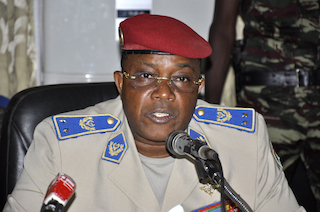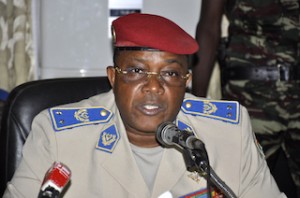

Burkina Faso’s army chief General Nabere Honore Traore took power of the nation on Friday after President Blaise Compaore announced his resignation on Friday following violent protests against his attempt to extend a 27-year rule.
In a statement read on national television, Compaore announced his resignation and called for elections to be held with in 90 days. General Honore Nabere Traore then took the reigns in Ouagadougou.
On Thursday, hundreds of thousands of people turned out in the streets of the capital to prevent members of parliament from voting to amend the Constitution, a move that would have allowed the 63-year-old president to compete for another term of presidency.
“When we came out on the streets, we simply wanted Compaore’s resignation. He has wasted a lot of time,” Gy Herve Kam from local civil society group “Balai Citoyen” that is hostile to Compaore’s leadership, told Xinhua in Ouagadougou.
The protest soon escalated into conflict. An opposition source said the provisional death toll from Thursday’s protest was 30 people, while 100 others were injured.
At the same time, major public institutions such as parliament, the public broadcaster as well as homes of Compaore’s family members were ransacked. Shops in the capital were also vandalized and looted, while the headquarters of the ruling party Congress for Democracy and Progress was burnt down.
Protests also broke out in different cities across the country, especially Koudougou in the central-west, Fada in the east, Banfora in the west, Dori in the north and Bobo Dioulasso, the country’s second biggest city where lives were also lost.
“Things have moved so fast. This means the regime was built on quicksand. In less than 2 hours, Blaise’s power had crumbled,” said Issouf Konate, an author who admitted that he was among the first people to “capture the national radio.”
Following Thursday’s events, Compaore who came to power in 1987 after overthrowing his brother Thomas Sankara in a coup, withdrew the bill proposing amendment of the constitution and urged protesters to place national interests above personal interests.
However he refused to resign. “I remain ready to work through the transition period, after which I will hand over power to a democratically elected president,” he promised in a message broadcast on a local private television station, after the military proposed a transition government.
“At the moment, to prevent the worsening and degradation of the national political situation, Burkina Faso’s presidency will be occupied by retired army general, Kwame Lougue, and the prime minister’s post will be handled by the opposition leader Zephirin Diabre,” said army chief General Nabere Honore Traore in a statement, adding that “the two will lead a transition government for a period of 12 months after which free, transparent and democratic elections will be organized.”
Despite the curfew declared by the army chief general, the president’s message emboldened many protesters to come out again and demand for his resignation.
“Compaore’s declaration is ridiculous. We no longer have confidence in him. We believe he is only retreating so that he can start to massacre us,” president of the Union for Renewal/ Sankarist Party, Me Benewende Sankara, said.
“Compaore must leave. He is considering himself as the transition president, and that is what we do not want to hear,” added Yacouba Kabore, a student at the University of Ouagadougou.
After having set Parliament ablaze on Thursday, the population assembled on Friday morning at the Place of the Nation in Ouagadougou to “go and liberate the Presidential Palace.”
Angry at the president’s reaction and what they termed as “irresponsibility from the army,” the population came out in large numbers in the streets of several localities to demand for Compaore’s resignation.
At the same time, the African Union voiced deep concerns over the situation in Burkina Faso as its Chairperson Nkosazana Dlamini- Zuma sent a high-level team to the country to consult with all the Burkinabe stakeholders.
Source: Xinhua




